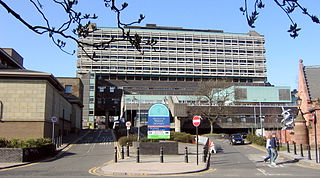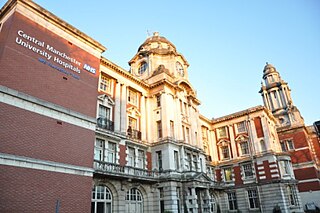Related Research Articles
In medicine, comorbidity—from Latin morbus ("sickness"), co ("together"), -ity —is the presence of one or more additional conditions often co-occurring with a primary condition. Comorbidity describes the effect of all other conditions an individual patient might have other than the primary condition of interest, and can be physiological or psychological. In the context of mental health, comorbidity often refers to disorders that are often coexistent with each other, such as depression and anxiety disorders. The concept of multimorbidity is related to comorbidity but presents a different meaning and approach.

Intensive care medicine, also called critical care medicine, is a medical specialty that deals with seriously or critically ill patients who have, are at risk of, or are recovering from conditions that may be life-threatening. It includes providing life support, invasive monitoring techniques, resuscitation, and end-of-life care. Doctors in this specialty are often called intensive care physicians, critical care physicians, or intensivists.

The Royal London Hospital is a large teaching hospital in Whitechapel in the London Borough of Tower Hamlets. It is part of Barts Health NHS Trust. It provides district general hospital services for the City of London and Tower Hamlets and specialist tertiary care services for patients from across London and elsewhere. The current hospital building has 845 beds and 34 wards. It opened in February 2012.

Manchester Royal Infirmary (MRI) is a large NHS teaching hospital in Chorlton-on-Medlock, Manchester, England. Founded by Charles White in 1752 as part of the voluntary hospital movement of the 18th century, it is now a major regional and national medical centre. It is the largest hospital within Manchester University NHS Foundation Trust, and based on its Oxford Road Campus in South Manchester where it shares a site with the Royal Manchester Children's Hospital, Manchester Royal Eye Hospital and Saint Mary's Hospital as well as several other educational and research facilities. The Hospital is also a key site for medical educational within Manchester, serving as a main teaching hospital for School of Medical Sciences, University of Manchester.

Netcare Limited is a South African private healthcare company. It operates through a number of subsidiaries and employs just over 21 000 people.

The Bristol Royal Infirmary, also known as the BRI, is a large teaching hospital in the centre of Bristol, England. It has links with the nearby University of Bristol and the Faculty of Health and Social Care at the University of the West of England, also in Bristol.

The School of Medical Sciences at the University of Manchester is one of the largest in the United Kingdom with around 6,000 undergraduates, 3,000 postgraduates and 2,000 staff. It is the third oldest medical school in England and the largest medical school in the United Kingdom. The Faculty is a member of the Manchester Academic Health Science Centre and has four affiliated teaching hospitals at Manchester Royal Infirmary, Wythenshawe Hospital, Salford Royal Hospital and the Royal Preston Hospital.

The Western Infirmary was a teaching hospital situated in Yorkhill in the West End of Glasgow, Scotland, that was managed by NHS Greater Glasgow and Clyde. It was opened in 1874 and closed in 2015.

North Manchester General Hospital (NMGH) is a large NHS hospital in Crumpsall, North Manchester, England. It is operated by Manchester University NHS Foundation Trust. There is an accident and emergency unit, together with a maternity unit, high dependency unit and a mental health wing. A plan to rebuild the hospital was announced by Boris Johnson in the 2019 General Election campaign, and in November 2020 a £54 million funding bid for improvement works was made by the Trust, Manchester City Council, and Manchester Health and Care Commissioning.

Queen Elizabeth Hospital is a hospital in Woolwich in the Royal Borough of Greenwich. It was opened in March 2001 and serves patients from the Royal Borough of Greenwich and the London Borough of Bexley. The hospital was built to accommodate the services previously provided at Greenwich District Hospital and Brook General Hospital, and is a Private Finance Initiative hospital. It is managed by the Lewisham and Greenwich NHS Trust.

Leicester General Hospital (LGH) is a National Health Service hospital located in the suburb of Evington, about three miles east of Leicester City Centre, and is a part of University Hospitals of Leicester NHS Trust. It has approximately 430 beds. The hospital is the largest employer in the area.

East Lancashire Hospitals NHS Trust is an NHS hospital trust in Lancashire, England. It was established on 1 September 2002, as the result of a locally controversial, cost saving merger of Blackburn Hyndburn & Ribble Valley NHS Trust and Burnley Health Care NHS Trust, first announced in September 1999.
Geriatric intensive care unit is a special intensive care unit dedicated to management of critically ill elderly.

Wythenshawe Hospital is a large NHS teaching hospital in Wythenshawe, South Manchester, England. It provides general medical services to the local and regional area as well as being a national centre for respiratory medicine and cardiothoracic surgery. It is one of the larger hospitals within Manchester University NHS Foundation Trust.

Central Manchester University Hospital NHS Foundation Trust, was a large NHS foundation trust in Manchester, United Kingdom, that was founded in 2009 and merged with University Hospital of South Manchester NHS Foundation Trust in 2017 to form the current Manchester University NHS Foundation Trust.
The Sepsis Six is the name given to a bundle of medical therapies designed to reduce mortality in patients with sepsis.
The "Greater Manchester Model" of NHS health care was a system uniquely devolved within England, by way of close integration with the Greater Manchester Combined Authority and local authorities, led by the Mayor of Greater Manchester. In July 2022 the Greater Manchester integrated care system took over responsibility for health and social care in the conurbation. The financial plan for 2022–23 had an initial shortage of £187 million.
Pat Ashworth SRN, SCM, was a British nursing sister who specialised in intensive care.
Manchester University NHS Foundation Trust is an NHS Acute Foundation Trust which operates 10 hospitals throughout Greater Manchester. It is the largest NHS trust in the United Kingdom, with an income of £2.2bn and 28,479 staff in 2021–2022.
Dr Samantha Batt-Rawden is a British intensive care and pre-hospital doctor.
References
- 1 2 3 "Manchester Medical Director is first female doctor to win national intensive care award". Manchester University NHS Foundation Trust. 2022-08-03. Retrieved 2024-01-14.
- ↑ "Professor Jane Eddleston". Manchester University NHS Foundation Trust. Retrieved 2024-02-01.
- ↑ "Oversight board". Manchester Rare Conditions Centre. Retrieved 2024-02-01.
- 1 2 3 Armitage, Mary; Eddleston, Jane; Stokes, Tim; Guideline Development Group at the NICE (2007-08-04). "Recognising and responding to acute illness in adults in hospital: summary of NICE guidance". BMJ (Clinical Research Ed.). 335 (7613): 258–259. doi:10.1136/bmj.39272.679688.47. ISSN 1756-1833. PMC 1939787 . PMID 17673769.
- 1 2 Halle-Richards, Sophie (2022-08-04). "Doctor who battled covid on frontline becomes first woman to win national award". Manchester Evening News. Retrieved 2024-01-14.
- ↑ "Medical lead says Manchester ICU capacity 'not overwhelmed'". Yahoo News. 2020-10-19. Retrieved 2024-01-14.
- ↑ "Coronavirus: This is the picture in Greater Manchester's hospitals at the moment". The Bolton News. 2020-10-12. Retrieved 2024-01-14.
- ↑ "Second written statement of Jane Eddleston, on behalf of Manchester University NHS Foundation Trust | Infected Blood Inquiry". www.infectedbloodinquiry.org.uk. Retrieved 2024-01-14.
- ↑ "Greater Manchester secures multi-million investment to improve the diagnosis and treatment of disease to save more lives". Greater Manchester secures multi-million investment to improve the diagnosis and treatment of disease to save more lives. Retrieved 2024-01-14.
- ↑ "Launch event marks multi-million-pound investment into health research". Launch event marks multi-million-pound investment into health research. Retrieved 2024-01-14.